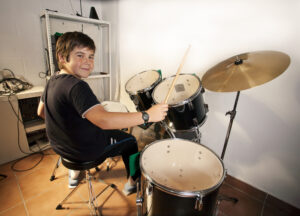 Have you been considering Atlanta drum lessons for your kids but can’t decide if you think it’s worth the money? Are you saying things to yourself like “he can play the drums pretty good already, so what’s the point in paying for lessons?” This article explains a few examples of how drum lessons can help your child become better at their instrument.
Have you been considering Atlanta drum lessons for your kids but can’t decide if you think it’s worth the money? Are you saying things to yourself like “he can play the drums pretty good already, so what’s the point in paying for lessons?” This article explains a few examples of how drum lessons can help your child become better at their instrument.
Even if they already have experience behind the kit, investing in drum lessons can benefit your children in 3 specific ways: by improving mental attention, helping burn excess energy, and teaching them the art of music.
Improving Mental Attention
Playing the drums requires a strong sense of rhythm that can be further developed with drum lessons. The drummer is responsible for keeping tempo for the entire band – if they fall out of rhythm, they risk throwing everyone else off the beat! In order to keep the beat, drummers often have to spend most of their mental energy focusing on timing.
Even if your child can already play the drums and keep a solid beat, they still might benefit from drum lessons. A good Atlanta drum teacher will show your child helpful and proven techniques to improve their focus and sharpen their rhythm faster. The guidance of a teacher will give your child the tools necessary to become a great drummer, but that’s not all. Research suggests that learning to play an instrument improves mental agility and can even increase IQ. Drumming utilizes both sides of the brain at the same time; the analytically driven left side, and the creatively artistic right side. If you’d like to encourage your child’s healthy interest in drumming, then drum lessons might be a worthy investment!
Helping Burn Excess Energy
One thing is obvious, and that is this: kids are known to have lots of energy! Keeping them busy is a task that many parents spend a lot of time trying to accomplish through extracurricular activities such as sports, video games, and an occasional weekend at grandma’s. Formally learning to play the drums would be a great use of time for keeps with consistently high levels of energy. It requires constant movement and coordination, virtually guaranteeing that they will break a sweat and have fun while doing it! Lessons In Your Home proudly employs professional drum teachers who use fun and engaging exercises to channel your child’s energy into a powerful form of self control behind the kit.
Teaching The Art Of Music
There is a common misconception surrounding drums that must be debunked. That is the belief that drums aren’t musical in the same way that a guitar or a piano is musical. Drums aren’t just about clashing cymbals and noise. Drummers must understand musical notes, rhythms, and the relationship between the two. Drum lessons will teach your child the language of the rhythm section in a way that they would not be able to learn without formal training. NFL players still show up for practice every week, right? That’s because even the best need to spend time sharpening the axe.
Music is a fun and fulfilling artform that can benefit children in many ways. It can help them become more open and expressive, giving them confidence and the ability to showcase their hard earned skills by making something beautiful. While many kids might pick up drumsticks on their own and pursue it as a hobby, due to the lack of guidance, there is an increased chance that they will eventually lose interest and give up on music. Enrolling your child in drum lessons will put a teacher in their life who will encourage them to keep playing, even when it gets hard. That teacher will remind them that if they stick to it, they will be glad they did later down the road.
In Conclusion
Perhaps you think your child is already a rockstar on the drums and you don’t see the point in paying for lessons. We get it! Drum lessons are quite obviously not required to be a great drummer. There are many professional drummers out there who have never had a single lesson! Nevertheless, drum lessons should be considered an investment that could only prove to be worthwhile. They will help your child develop their skills more efficiently and might prevent them from giving up or losing interest in music.
Drum teachers who work with Lessons In Your Home are professionals behind the kit. They are screened prior to hiring to ensure that they are personable and able to work well with children. Contact Us today to learn more about how Lessons In Your Home can help you find the perfect drum teacher for your child living near you. Our teachers come right to your home for every lesson, plus we offer virtual music lessons, too. Our online music lessons are taught by local music teachers with live lessons tailored to your family!
